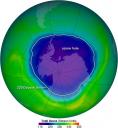– This is an editorial from Nature Magazine; one of the world’s preeminent magazines about science and for scientists.
= = = = =
The director of the Environmental Protection Agency is sabotaging both himself and his agency.
The US Environmental Protection Agency (EPA) is fast losing the few shreds of credibility it has left. The Bush administration has always shown more zeal in protecting business interests than the environment (see Nature 447, 892–893; 2007). But the agency’s current administrator, Stephen Johnson, a veteran EPA toxicologist who was promoted to the top slot in 2005, has done so with reckless disregard for law, science or the agency’s own rules — or, it seems, the anguished protests of his own subordinates.
On 27 February, to take the first of two examples that surfaced last week, Senator Barbara Boxer (Democrat, California) used a routine budget hearing to give Johnson a grilling. Why hadn’t he given her state permission to regulate the carbon dioxide emissions of vehicle exhausts? California needs a waiver from the EPA to regulate in this way, and in the past such waivers have been granted easily. And, Boxer reminded him via a series of leaked memos and PowerPoint presentations, Johnson’s own top-level staff begged him to sign the waiver in this case. “This is a choice only you can make,” one colleague wrote to him. “But I ask you to think about the history and the future of the agency in making it. If you are asked to deny this waiver, I fear the credibility of the agency that we both love will be irreparably damaged.”
More… ➡
